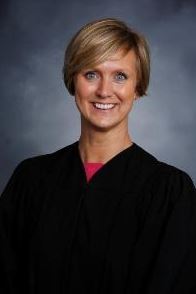In Minnesota, there are nearly 300 district court judges who preside over matters in ten judicial districts. While the Minnesota Rules of Court provide attorneys with significant information applicable to court proceedings, each judge may have his or her individual preferences with respect to motion practice and courtroom conduct.
In an effort to assist attorneys who may be appearing before a judge for the first time, the MSBA Civil Litigation Section Governing Council provided all district court judges with a brief survey. The responses that we received are organized on the right by judicial district and then alphabetically by judge’s name. We hope you find these responses to be helpful in your preparation for district court appearances.
For information about this project or to report an error in any judicial directory listing, contact Kara Haro, MSBA staff liaison to the Civil Litigation Section.
Fourth Judicial District Judges | Courtroom Preferences
Anderson, Jamie
 District Court Judge
District Court Judge
Counties: Hennepin County
State Court Bio: View Bio
Contact with Chambers:
- Set forth your preferred method to contact chambers (telephone, email, etc.). email - 4thJudgeAndersonStaff@courts.state.mn.us
- To whom may attorneys direct scheduling/logistical questions? staff email
- To whom may attorneys direct substantive questions? staff email
Motion Practice:
- Do you accept telephone calls from attorneys to rule on discovery disputes that occur during depositions? Not generally.
- How much time do you allot for motion hearings? 30 minutes, unless discussed prior to scheduling
- Set forth your practices and procedures with respect to attending a hearing by telephone or video conference. Often will approve appearance by phone or video.
- Set forth your practices and procedures with respect to discovery motions. Not favored. Expect all parties to litigate in good faith.
- Do you have particular requirements or procedures relating to requests to amend the scheduling order? Do not assume the court will grant amendments to a scheduling order just because the parties have agreed.
- Set forth your practices and procedures with respect to default proceedings. Moving party must be prepared.
- Set forth your practices and procedures with respect to handling emergency motions. After receiving the judge assignment, call chambers to determine whether court will set a hearing.
Written Submissions:
- Do you want to receive paper courtesy copies of the parties' written submissions? If you do, set forth the number and preferred format of courtesy copies and identify any document type you do not want to receive. One paper courtesy copy if filings are more than 20 pages.
Pretrial Procedures:
- Set forth your practices and procedures for handling motions in limine. Substantive (non-routine) motions in limine should be set for hearing prior to the first day of trial.
- What is your schedule for a typical trial day? Approximately 9a - 12:15 and 1:30 - 4:30p.
- Set forth your voir dire procedures. The court does the bulk of the questioning. Parties are able to submit questions to the court to ask the jury. Attorneys should use their questioning to follow up with jurors.
- Do you impose time limits with respect to opening statements and closing arguments? Depends on the case.
- May attorneys obtain daily transcripts during trial? If so, what procedure should attorneys follow? Generally, no.